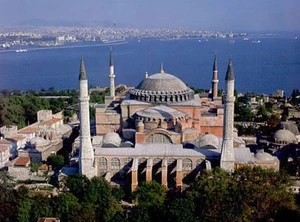
The flag of Turkey.
The Republic of Turkey (Turkish: Türkiye Cumhuriyeti is a country which occupies the Anatolian Peninsula of western Asia, as well as a small section of eastern Europe at the Bosporus Strait.
People[]

Sultan Ahmed Mosque in Istanbul, Turkey
Modern Turkey encompasses bustling cosmopolitan centers, pastoral farming villages, barren wastelands, peaceful Aegean coastlines, and steep mountain regions. More than half of Turkey's population lives in urban areas that juxtapose Western lifestyles with more traditional ways of life.
The Turkish state has been officially secular since 1924. Approximately 99% of the population is Muslim. Most Turkish Muslims follow the Sunni traditions of Islam, although a significant number follow Alevi and Shiite traditions. Questions regarding the role of religion in society and government, the role of linguistic and ethnic identity, and the public's expectation to live in security dominate public discourse. Turkish citizens who assert a Kurdish identity constitute an ethnic and linguistic group that is estimated at up to 12 million in number.
- Population (2006): 72.9 million.
- Annual population growth rate (2004 est.): 1.33%.
- Ethnic groups: Turkish, Kurdish, other.
- Religions: Islam 99%, Christianity, Baha'i, and Judaism.
- Languages: Turkish (official), Kurdish, Zaza, Arabic, Armenian, Greek.
- Education: Years compulsory--8. Attendance--97.6%. Literacy--86.5%.
- Health: Infant mortality rate--39.4/1,000. Life expectancy--68.5 yrs.
- Work force (23 million): Agriculture--35.6%; industry--17.5%; services--47.2%.
Human-rights abuses, especially against Christians remain a problem [1] and the frequency of violent attacks on Christian ministers and priests is still high [2] [3]
History[]

Hagia Sophia, Istanbul, Turkey.
Mustafa Kemal, celebrated by the Turkish State as a Turkish World War I hero and later known as "Atatürk" or "father of the Turks," led the founding of the Republic of Turkey in 1923 after the collapse of the 600-year-old Ottoman Empire and a three-year war of independence. The empire, which at its peak controlled vast stretches of northern Africa, southeastern Europe, and western Asia, had failed to keep pace with European social and technological developments. The rise of national consciousness impelled several national groups within the Empire to seek independence as nation-states, leading to the empire's fragmentation. This process culminated in the disastrous Ottoman participation in World War I as a German ally. Defeated, shorn of much of its former territory, and partly occupied by forces of the victorious European states, the Ottoman structure was repudiated by Turkish nationalists brought together under the leadership of Mustafa Kemal. The nationalists expelled invading Greek, Russian, French and Italian forces from Anatolia in a bitter war. After the proclamation of the Republic of Turkey the temporal and religious ruling institutions of the old empire (the sultanate and caliphate) were abolished.
The leaders of the new republic concentrated on consolidating their power and modernizing and Westernizing what had been the empire's core--Asian Anatolia and a part of European Thrace. Social, political, linguistic, and economic reforms and attitudes decreed by Atatürk from 1924-1934 continue to be referred to as the ideological base of modern Turkey. In the post-Ataturk era, and especially after the military coup of 1960, this ideology came to be known as "Kemalism" and his reforms began to be referred to as "revolutions." Kemalism comprises a Turkish form of secularism, strong nationalism, statism, and to a degree a western orientation. The continued validity and applicability of Kemalism are the subject of lively debate in Turkey's political life. The current ruling AK Party comes from a tradition that challenges many of the Kemalist precepts and is driven in its reform efforts by a desire to achieve EU accession.
Turkey entered World War II on the Allied side shortly before the war ended, becoming a charter member of the United Nations. Difficulties faced by Greece after World War II in quelling a communist rebellion and demands by the Soviet Union for military bases in the Turkish Straits prompted the United States to declare the Truman Doctrine in 1947. The doctrine enunciated American intentions to guarantee the security of Turkey and Greece and resulted in large scale U.S. military and economic aid under the Marshall Plan. After participating with United Nations forces in the Korean conflict, Turkey in 1952 joined the North Atlantic Treaty Organization (NATO). Turkey is currently a European Union candidate, although this has been clouded by their refusal to acknowledge the Armenian genocide.
See also[]
References[]
External links[]
| Copyright Details | |
|---|---|
| License: | This work is in the Public Domain in the United States because it is a work of the United States Federal Government under the terms of Title 17, Chapter 1, Section 105 of the U.S. Code |
| Source: | File available from the United States Federal Government [1]. |